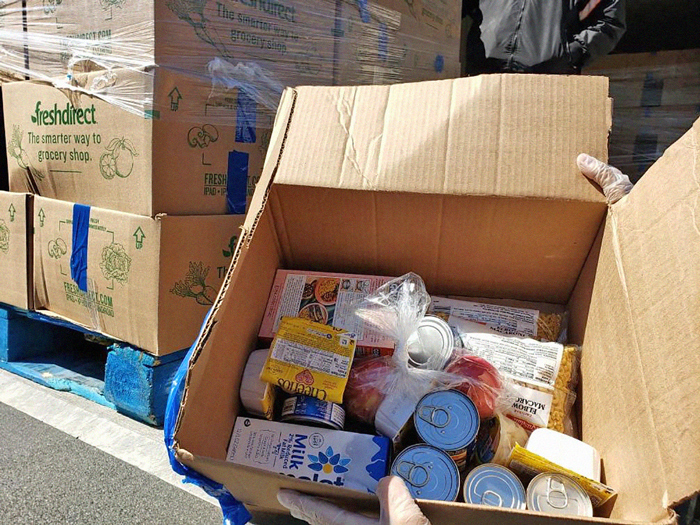Photo Courtesy of the Office of the Queens Borough President
According to Food Bank for NYC, to date, 32 percent of emergency food programs, which includes food pantries and soup kitchens, have ceased operations due to lack of supplies and resources.
By Michael V. Cusenza
The Cuomo and de Blasio administrations must release $25 million each in emergency funding—for a total of $50 million—to struggling food banks and food-assistance programs during the COVID-19 pandemic to halt a looming hunger crisis, a coalition including City Council Speaker Corey Johnson, Councilman Mark Treyger (D-Brooklyn), chairman of the Council Education Committee, and members of the City Council’s Budget & Negotiations Team, along with the leaders of Met Council, City Harvest, and other major food security organizations, announced Friday.
According to Food Bank for NYC, to date, 32 percent of emergency food programs, which includes food pantries and soup kitchens, have ceased operations due to lack of supplies and resources. However, the majority is still serving and straining to meet growing demand, the bank noted.
“Sadly, food insecurity is a reality for many New Yorkers, and the coronavirus pandemic is exacerbating an already dire situation,” said Councilwoman Karen Koslowitz (D-Forest Hills).
The combined $50 million will provide funding for more than 19 million meals, which will allow for 2.1 million food packages each consisting of nine meals per U.S. Department of Agriculture guidelines, according to Met Council.
The coalition said the State and City money also will go towards the many challenges facing the food banks and assistance programs, including:
Demand: Hundreds of thousands of New Yorkers have lost their jobs in the past few weeks. Food pantries, organizations that do home delivery of food to individuals in need, senior services, and youth service organizations need more funding to deal with the ongoing surge in demand. Organizations that do food delivery to individuals in need are additionally facing increased demand.
Food Shortages and Higher Prices: Wholesale prices for food staples have gone up because of the overwhelming demand caused by the pandemic. In addition, the coalition has heard reports of food vendors becoming unreliable, canceling orders, price gouging, and manipulating delivery schedules.
Staffing Issues: Many organizations, especially the smaller food pantries, are staffed primarily by volunteers. Many of the volunteers are over 60, which means they must practice the most aggressive forms of social distancing and can no longer be of service. Other volunteers can no longer donate their time because of the myriad of challenges the pandemic has caused in their lives. Organizations need to be able to transition quickly to a paid staff model, which will help out-of-work individuals as well as these organizations and the people they serve.
Changes in operational models: Many organizations need to transition to food delivery models – particularly those who serve seniors or people with health challenges vulnerable to COVID-19.
“Citymeals on Wheels has delivered 200,000 emergency meals to older New Yorkers across the five boroughs and is now preparing an additional 300,000 emergency meals to meet the growing demand of the City’s most vulnerable population in response to the COVID-19 pandemic,” Citymeals on Wheels Executive Director Beth Shapiro said. “To address this unprecedented challenge, the City and state must release funds to help ensure the stability of this vital lifeline.”

